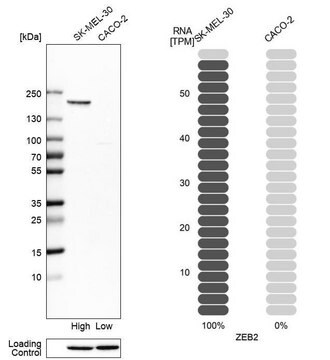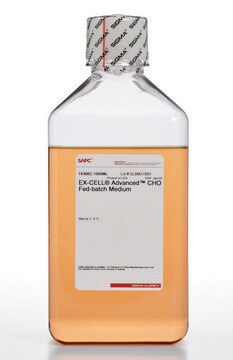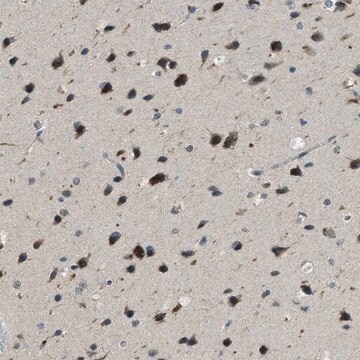SRP3008
APRIL human
recombinant, expressed in Hi-5 Insect cells, ≥95% (SDS-PAGE), ≥95% (HPLC), suitable for cell culture
Sinonimo/i:
A Proliferating-inducing Ligand, TNFSF13, TRDL-1?
Autenticatiper visualizzare i prezzi riservati alla tua organizzazione & contrattuali
About This Item
Codice UNSPSC:
12352200
NACRES:
NA.32
Prodotti consigliati
Origine biologica
human
Ricombinante
expressed in Hi-5 Insect cells
Saggio
≥95% (HPLC)
≥95% (SDS-PAGE)
Stato
lyophilized
PM
16.3 kDa
Confezionamento
pkg of 10 μg
tecniche
cell culture | mammalian: suitable
Impurezze
<0.1 EU/μg endotoxin, tested
Colore
white to off-white
N° accesso UniProt
Condizioni di spedizione
wet ice
Temperatura di conservazione
−20°C
Informazioni sul gene
human ... TNFSF13(8741)
Descrizione generale
APRIL, a member of the TNF superfamily, is expressed in monocytes, macrophages, certain transformed cell lines, certain cancers of colon, and lymphoid tissues. APRIL, along with another TNF family member, BAFF, compete for two receptors, TACI and BCMA. ARPIL has the ability to stimulate proliferation of various tumor cell lines including Jurkat T cells and MCF-7 carcinoma cells. Like BAFF, APRIL also stimulates the proliferation of B and T cells. The human APRIL gene codes for at least four alternatively spliced transcriptional variants, which give rise to different isoforms of the APRIL precursor protein. All isoforms can be cleaved by the protease, furin, to release a soluble C-terminal fragment, which comprises the TNF like receptor binding of the APRIL precursor. Recombinant human APRIL is a soluble 16.3 kDa protein, consisting of 146 amino acid residues. 11
Azioni biochim/fisiol
APRIL, a member of the TNF superfamily, is expressed in monocytes, macrophages, certain transformed cell lines, certain cancers of colon, and lymphoid tissues. Recombinant human APRIL is a soluble 16.3 kDa protein, consisting of 146 amino acid residues.
Sequenza
AVLTQKQKKQ HSVLHLVPIN ATSKDDSDVT EVMWQPALRR GRGLQAQGYG VRIQDAGVYL LYSQVLFQDV TFTMGQVVSR EGQGRQETLF RCIRSMPSHP DRAYNSCYSA GVFHLHQGDI LSVIIPRARA KLNLSPHGTF LGFVKL
Stato fisico
Lyophilized from 20 mM Sodium Acetate, pH 7.5 + 500 mM NaCl.
Ricostituzione
Centrifuge the vial prior to opening. Reconstitute in water to a concentration of 0.1-1.0 mg/ml. Do not vortex. This solution can be stored at 2-8°C for up to 1 week. For extended storage, it is recommended to further dilute in a buffer containing a carrier protein (example 0.1% BSA) and store in working aliquots at -20°C to -80°C.
Codice della classe di stoccaggio
11 - Combustible Solids
Classe di pericolosità dell'acqua (WGK)
WGK 3
Punto d’infiammabilità (°F)
Not applicable
Punto d’infiammabilità (°C)
Not applicable
Scegli una delle versioni più recenti:
Possiedi già questo prodotto?
I documenti relativi ai prodotti acquistati recentemente sono disponibili nell’Archivio dei documenti.
Fabienne Mackay et al.
Cytokine & growth factor reviews, 14(3-4), 311-324 (2003-06-06)
B cell activating factor belonging to the TNF family (BAFF) and apoptosis-inducing ligand (APRIL) are two related members of the TNF ligand superfamily. Although they share two receptors, TACI and BCMA, transgenic and knockout mice in this system reveal that
G Yu et al.
Nature immunology, 1(3), 252-256 (2001-03-23)
We report that the tumor neurosis factor homolog APRIL (a proliferation-inducing ligand) stimulates in vitro proliferation of primary B and T cells and increases spleen weight due to accumulation of B cells in vivo. APRIL functions via binding to BCMA
H B Shu et al.
Journal of leukocyte biology, 65(5), 680-683 (1999-05-20)
Members of the tumor necrosis factor (TNF) family play important roles in modulation of immune responses. We describe the identification and cloning of a novel TNF family member that has been designated as TALL-1. TALL-1 is a 285-amino acid type
Yoshiko Matsuda et al.
Cellular immunology, 295(2), 127-136 (2015-04-17)
Long-lived plasma cells (PCs) contribute to humoral immunity through an undefined mechanism. Memory B cells, but not human naïve B cells, can be induced to differentiate into long-lived PCs in vitro. Because evidence links a proliferation-inducing ligand (APRIL), a tumor
Il team dei nostri ricercatori vanta grande esperienza in tutte le aree della ricerca quali Life Science, scienza dei materiali, sintesi chimica, cromatografia, discipline analitiche, ecc..
Contatta l'Assistenza Tecnica.






